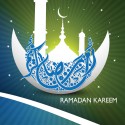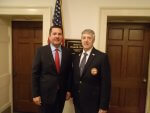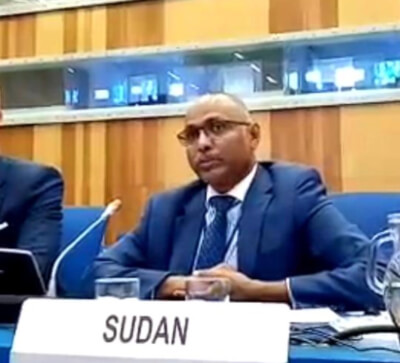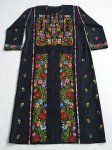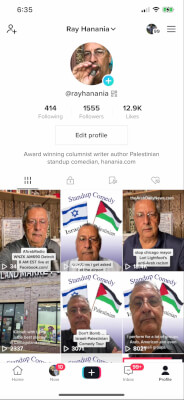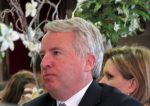![]()
Although Saudi Arabia has traditionally been associated with a more puritanical form of Islam — Wahabis — it is far more moderate and is the frontline against rising radicalism in the Muslim World. As the custodian of two of Islam’s holiest sites, Saudi Arabia recently organized a coalition of 34 Islamic allies to fight rising extremism among Muslims, declaring ISIS and Hezbollah as terrorist organizations.
By Ray Hanania
Saudi Arabia continues to be the focus of much of the uninformed, race-driven criticism of Islam and the Arabs by people in the West. But increasingly, despite its many years of financing the expansion of Islam in the world, Arabs and Muslims have been criticizing the desert kingdom.
Americans have often bashed Saudi Arabia, in a large part because of heir uneducated understanding of international politics and the competing dynamics of the world.
The truth is Saudi Arabia has been and continues to be one of America’s strongest Middle East and Muslim World ally. If it wasn’t for the Saudi policies, Americans would be paying four or five times more for their oil and gasoline, and in America the price of gasoline pretty much defines the reality of American economic life.
Everything in America is tied to the price of oil, from food to entertainment. Most importantly, Americans covet their ability to travel and their love for vacations — more than any other people, Americans like to escape from reality either by taking vacations or by turning towards the vast array of entertainment, movies, TV serials, and books.
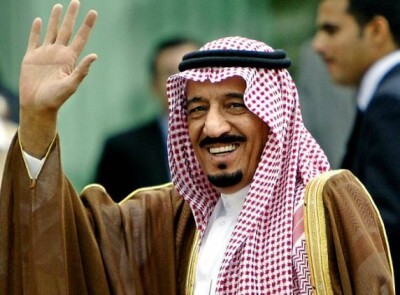
The Saudis learned that during the 1973 Arab Oil Embargo which presumably was intended as a backlash to America’s one-sided, biased support of Israel’s anti-Palestinian brutality, but in fact was driven by economic and world empowerment.
This week, Saudi Arabia took the lead again in redefining the Middle East and Muslim World, leading the formation of a 34 nation coalition to fight ISIS and rising Islamic extremism. While many Americans are afraid to use the term “Radical Islamic Extremism,” the Saudis are not.
The Deputy Crown Prince pointed out that an operations room of the alliance will be established in Riyadh to coordinate and support efforts to fight terrorism in all countries and parts of the Islamic world, noting that each country will contribute according to its capabilities.
He added, ‘Today, every Islamic country is fighting terrorism individually. The coordination of efforts is very important; and through this room, means and efforts will be developed for fighting terrorism all over the Islamic world.
On the support of more than ten Islamic countries to this alliance, he said: ‘These countries are not outside of the alliance, these countries have measures to be taken before joining the alliance. In light of the keenness to accomplish this alliance as soon as possible, the announcement of the 34 countries was made and, God willing, the rest of the countries will join this Islamic alliance.’
The“Islamic Military Alliance” was been formed specifically to fight terrorism, the Saudi Arabia Press Association reported.
The coalition consists of 34 countries including include Jordan, the UAE, Pakistan, Bahrain, Bangladesh, Benin, Turkey, Chad, Togo, Tunisia, Djibouti, Senegal, Sudan, Sierra Leone, Somalia, Gabon, Guinea, the partially-recognized state of Palestine, the Islamic Federal Republic of the Comoros, Qatar, Cote d’Ivoire, Kuwait, Lebanon, Libya, Maldives, Mali, Malaysia, Egypt, Morocco, Mauritania, Niger, Nigeria, Yemen.
The Saudis unhesitatingly condemned the ISIS terrorism in Paris and in the United States at San Bernardino. And they have strongly denounced Hezbollah, the Lebanese Shi’ite militia that through its ties to Iran have become one of the most powerful aggressive military presence in the Middle East next only to Israel. The Saudis also were the strongest supporters of America’s war against Iraqi dictator Saddam Hussein both in the 1990 and 2003 wars, and they served as staging grounds for the U.S. Military, providing a protective base for American soldiers.
Americans have been skeptical of Saudi Arabia’s policies mainly because of the Saudi’s poor public relations. They are deficient in educating Americans about the benefits of their policies, have allowed themselves to be perceived as extravagant dictators, and funders of some of the most radical Islamic evangelism.
Americans, who are driven by racism and stereotypes in understanding the Middle East, Arab World and Muslims, also remember that 15 of the 19 hijackers on Sept. 11, 2001 were Saudi Arabian citizens. Osama Bin Laden was the son of a prominent Saudi Arabian family that owns the region’s most prolific and connected construction company, The Saudi BinLaden Group (SBG).
But the truth is the Saudis are the strongest voice against extremism in Iran, driven mainly by their religious differences with Iranians. The majority of Iranians are Shi’ite, an extremist radical off-shoot of the mainstream Islamic religious group, Sunnis, which is the dominant religion in Saudi Arabia. Wahhabism is a conservative form of the Sunni religion. Saudis says that the term “Wahabis” is a derogatory name for their religion, which they define as being Salafi.
Although Americans are the most educated people in the World, they are the least educated about the world. Americans have a hard time understanding the critical distinctions between the various Islamic religious sects (Sunni, Shi’ite, Wahabi, and Salafi) and the distinctions in the Arab World such as the cultural and political differences that separate the Arab countries and Middle East regions (Jordan versus Saudi Arabia, and the Levant versus North Africa).
For example, the Saudi criticism against Hezbollah is not a new position that evolved out of the rising tensions with Israel or the rise of al-Qaeda and its new generation of ISIS. It stems from the decades long battle between Saudi Arabia and Iran in Lebanon and Syria when Syria occupied Lebanon. Syria, Iran and Hezbollah were allied against the Lebanese Christians, moderate Muslims and the Saudis during the very brutal Syrian occupation of Lebanon.
To compensate for their tyrannical and oppressive policies against civilians, Syria’s dictator Bashar al-Assad, like his Hitler-like father Hafez al-Assad, pandered to the fears of minorities pretending to be the benefactors and protectors of Christian minorities
Here are some of the recent releases from Saudi Arabia:
Saudi Arabia Condemns Terror Attacks in Paris
November 14, 2015 (Washington, DC) – The Kingdom of Saudi Arabia strongly denounces the terror attacks in Paris and urges for global solidarity to defeat terrorism.
A source at the Ministry of Foreign Affairs expressed condolences of the Saudi government and people to the families of the victims, the government and people of the France, and wished the injured a quick recovery.
Saudi Arabia underscores the importance of the world community to stand united to double its efforts to root out this dangerous and destructive plague, which targets the security and stability of the entire world. The source added that an effective means for joint international action was needed to fight those who sought to harm global security under any pretext.
Kingdom designates Hezbollah individuals and entities as terrorists
November 26, 2015 — Saudi Arabia today designated a number of Hezbollah individuals and entities as terrorists for their activities throughout the Middle East, including providing arms to groups outside of Lebanon.
The Ministry of Interior said in announcing the designation said that the Kingdom will continue to fight Hezbollah’s terrorist activities by all available means and will continue to work with partners around to make it unequivocally clear that its militias and its extremist activities will not be tolerated by any country.
The Ministry of Interior added that as Hezbollah is spreading chaos and instability, launching terrorist attacks and carrying-out criminal activities around the world, Saudi Arabia will continue to designate activists, leaders and entities belonging to Hezbollah and sanction them.
The Interior Ministry added that today’s designation is pursuant to Royal Decree A/44 on the Regulation of Crimes of Terrorism and Terror Financing, which targets terrorists, their supporters and those working with them or on their behalf, where any assets belonging to those classified names shall be frozen in accordance with regulations in the Kingdom and Saudi citizens be banned from any dealing with them.
Name : Ali Mousa Daqduq Al-Moussawi (as known as Ali Mousa Daqduq, Hamid Mohammed Jabr Al-Lami, Hamid Mohammed Al-Lami, Hussein Mohammed Jabr Al-Moussawi, Hamid Mohammed Jabr al-Moussawi Hamid Mohammed Daqdug Al-Moussawi and Hamid Majed Abdul Younis)
Nationality : Lebanese
Date of Birth: September 1, 1969; December 31, 1971; August 9, 1971, September 9, 1970, August 9, 1969, 5 March 1972
Place of birth : Beirut, Lebanon; Al-Karrada, Baghdad, Iraq .
Name : Mohammed Kawtharani (also known as Mohammed AlKawtharani and Jafar Al-Kawtharani
Nationality : Lebanese and Iraqi,
Date of Birth 1945.1959, 1961
Place of Birth : Najaf, Iraq.
Name : Muhammad Yusuf Ahmed Mansour (better knows as Sami Hani Shehab, Salem Basim Sami, Jamal Hani Halawi, Mohammed Yusuf Mansour Sami Shehab, Sami Shehab and Hani Halawi,)
Date of Birth: September 1970, 1 January 1974, 1980,
Place of Birth : Bint Jubail, Lebanon.
Adham Tabaja and his company and the group of development for business tourism and its subsidiaries.
Qasim Hajij.
Hussein Ali Faour, and car care center.
Mustafa Badr Eddin.
Ibrahim Aqil.
Fouad Shukr.
Abdel Nour Al-Shaalan.
Mohamed Najib Karim.
Mohammed Salman Fawaz.


- Israelisnipers shooting and killing hospital workers in Gaza - December 11, 2023
- CAIR Condemns Israeli Executions of Wounded, Unarmed Palestinian in West Bank - December 11, 2023
- Arab and Muslim American voters face a “simple choice” between Biden’s inhumanity and Trump’s edgy politics - December 9, 2023















